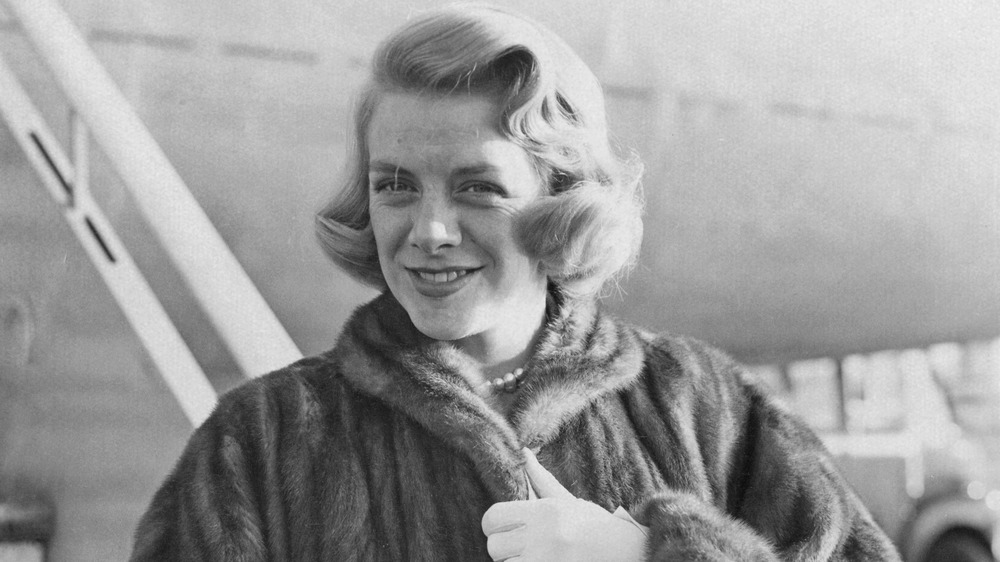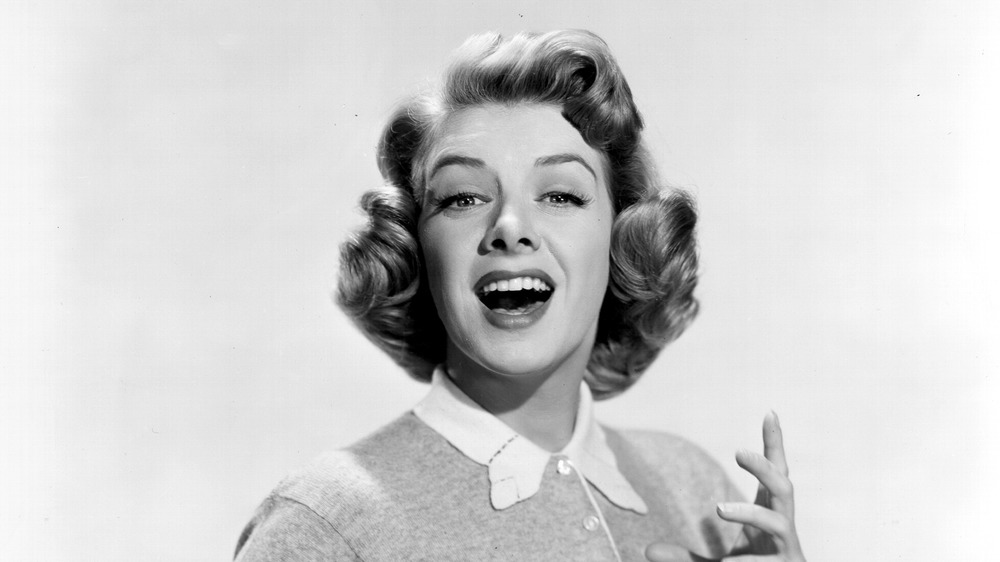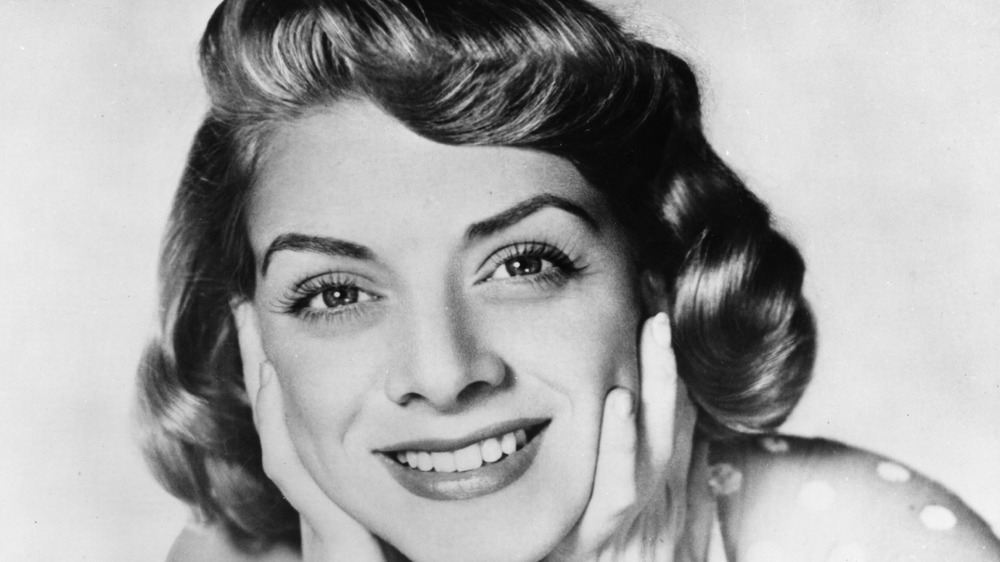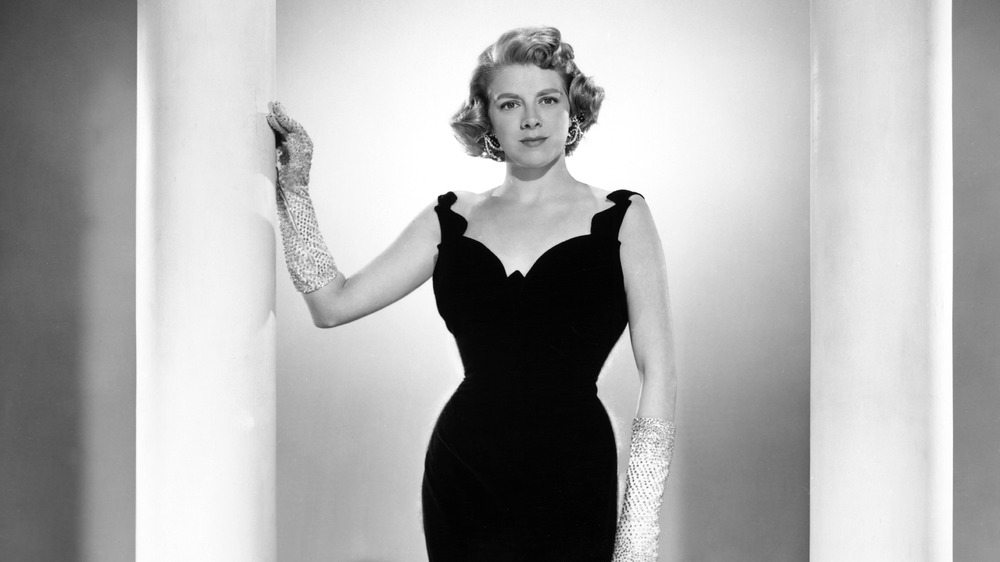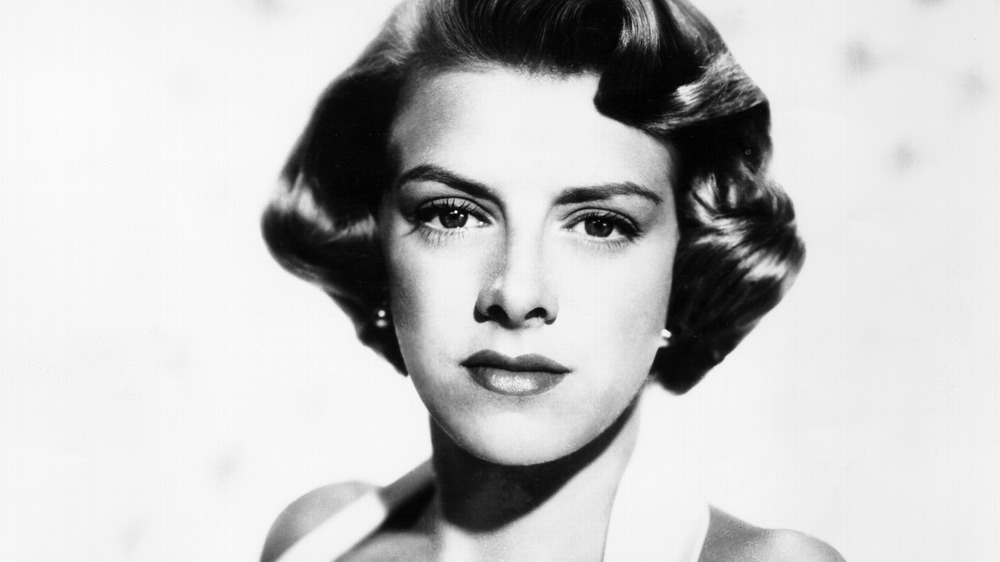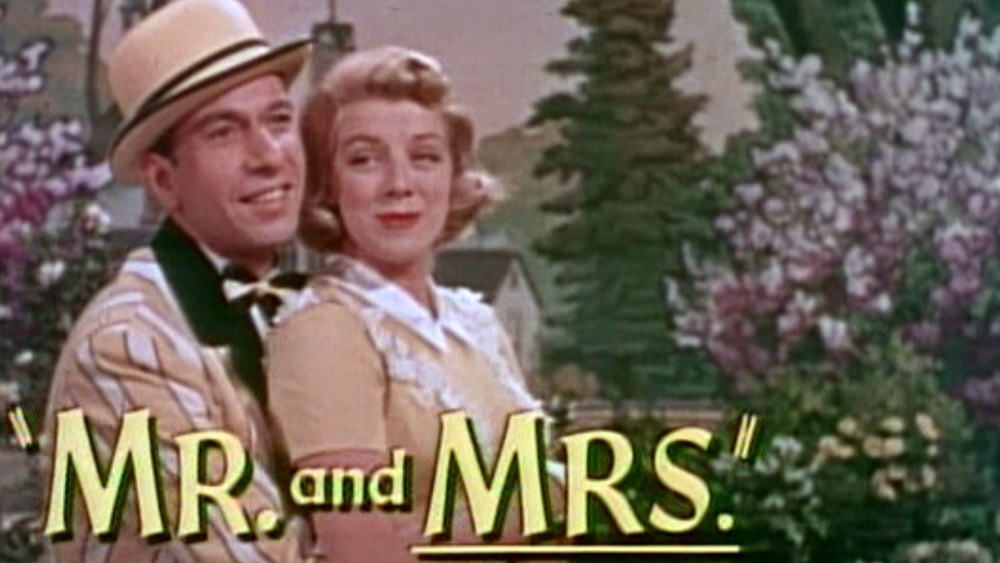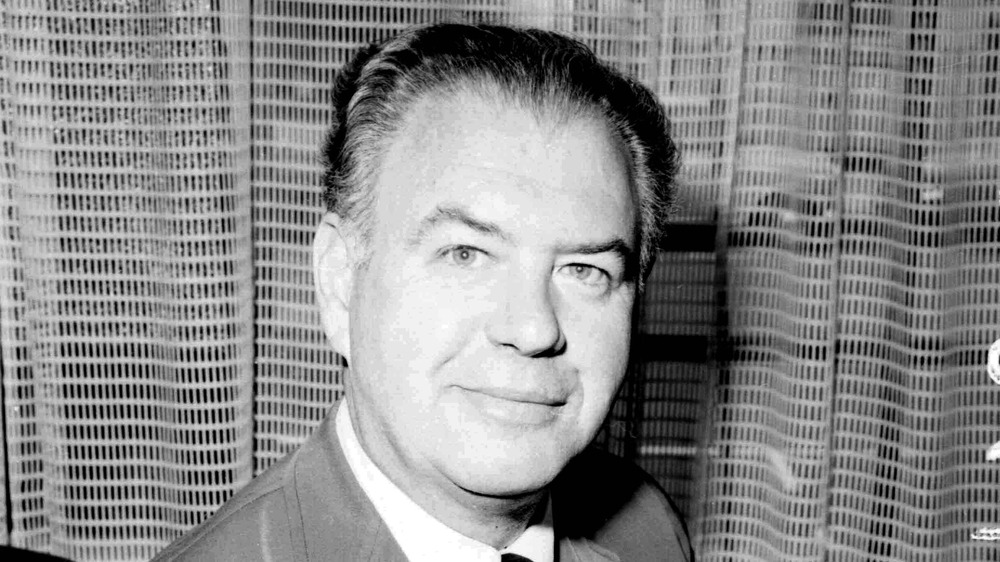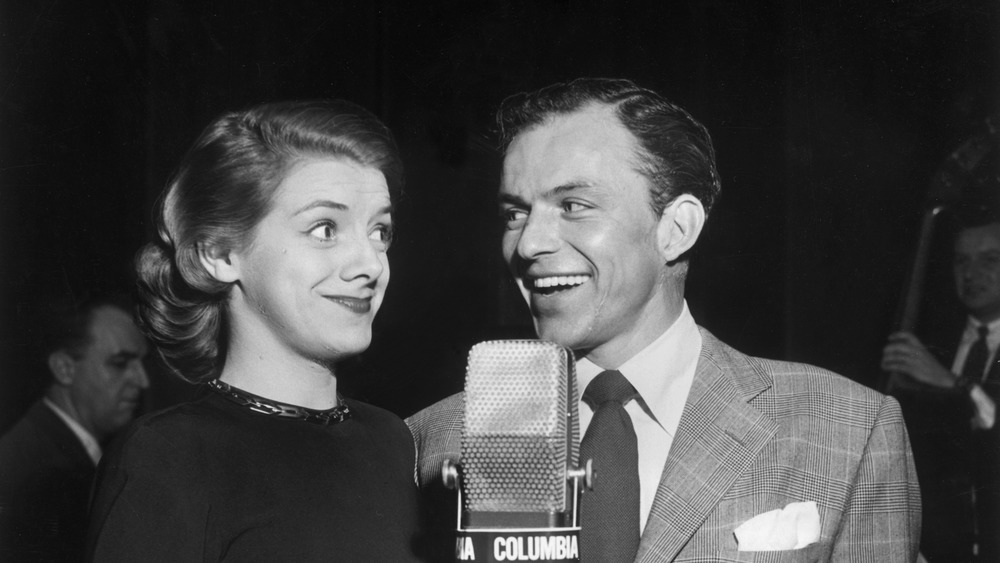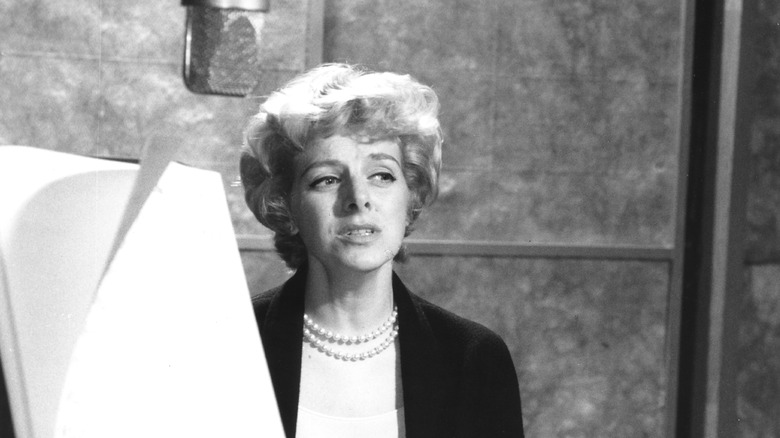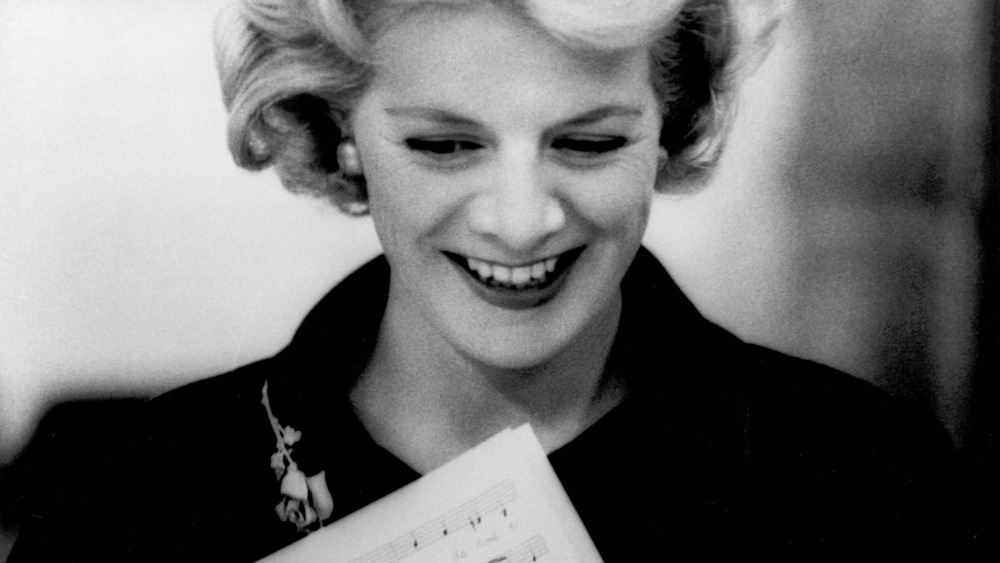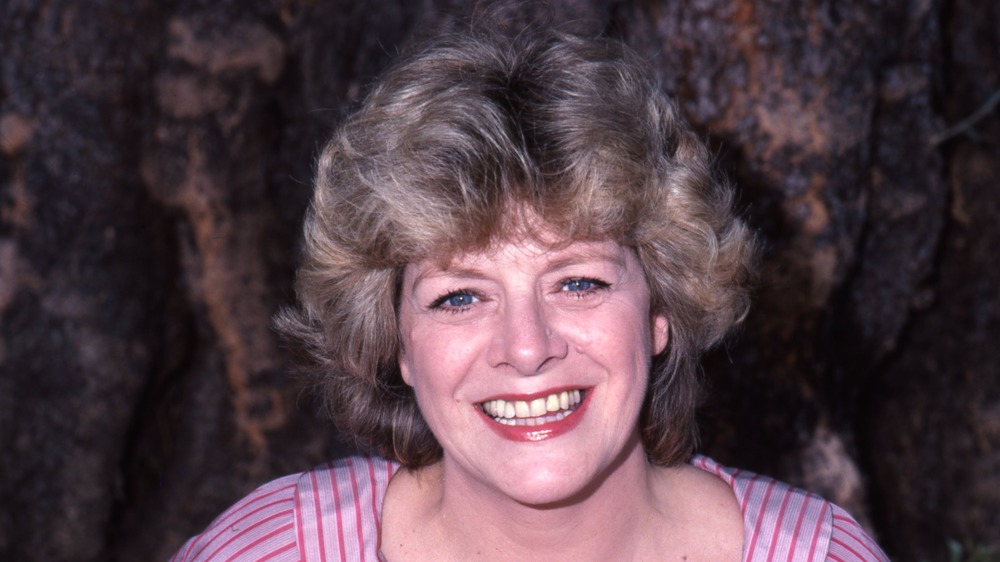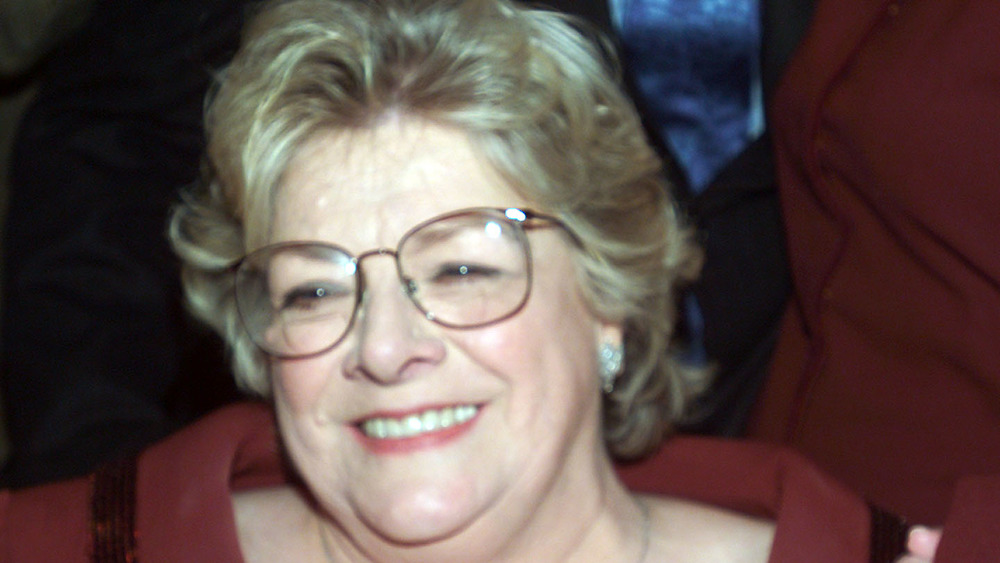The Tragic True Story Of Rosemary Clooney
We may receive a commission on purchases made from links.
Rosemary Clooney was a singer and star for the ages. Her voice was instantly recognizable for its deep, mellow warmth. In the 1950s, she was a radiant star in Hollywood, highly in demand for her smooth voice, blonde beauty, and girl-next-door charm. A glorious singer and musical actress, audiences couldn't get enough of Clooney. But beneath her bright smile and luminous eyes, many didn't realize the trials that Clooney was going through. From her essentially parentless youth to a volatile marriage to an almost wrecked career from drug and alcohol use, life had thrown Clooney through the wringer.
Despite her immense popularity and talent, Clooney had to struggle to get to Hollywood and then climb her way back up again when she almost destroyed herself and her career. Despite her seemingly sunny disposition in her songs and films, life wasn't always a ray of sunshine. This is the tragic true story of Rosemary Clooney.
Rosemary Clooney had a tumultuous childhood
Rosemary Clooney was born in Maysville, Kentucky, to parents Andrew Joseph Clooney and Marie Frances Guilfoyle Clooney. She was the eldest of five siblings that also included, Betty, Nick, Andy, and half-sister Gail Stone. According to The New York Times, Rosemary didn't have an easy time growing up. Her father was an alcoholic, and her mother was more interested in pursuing a job as a saleswoman. Her younger brother, Andy, died in a swimming accident.
When Rosemary was 15, her mother took her brother, Nick, and moved to California. Marie Frances Clooney would go on to meet someone else and have a fifth child — the Clooney siblings' half-sister, Gail Stone. Rosemary and 13-year-old Betty were left behind with their father, who was often in and out of jail for public drunkenness. The two girls were often shuttled between relatives. Eventually, their father disappeared and never came back again, leaving the girls without any money.
Not wishing to be entirely dependent on their relatives, Rosemary and Betty started trying to earn their own money. As noted by CNN, the girls would often collect glass soda bottles for easy cash, but they managed to get their big break after auditioning for a spot at their local radio station for $20 a week.
Rosemary Clooney's sister quit the act ... and died young
For a long time, Rosemary Clooney and her sister, Betty, performed together as a sister act. The New York Times noted their radio spot helped them land other gigs like high school events, local TV appearances, and performing with a local bandleader. Once the sisters auditioned to sing with the Tony Pastor Band, a nationally known band leader, it looked like they had made it. For three years, Rosemary and Betty traveled across the country with the band and earned pretty good money — $125 a week, according to World Biography. But Betty was getting tired of the traveling performer life and was ready to quit show business and head back home. However, Rosemary — who was considered to have the stronger voice — was offered a solo contract with Columbia Records. So, Betty went home, and Rosemary would rise to greater fame.
Unfortunately, Betty Clooney would die rather young. At the age of 45, Rosemary's beloved sister and former singing partner died of a sudden brain aneurysm. The loss of her sister at such an early age was an absolute gut punch to Rosemary.
Rosemary Clooney hated one of her hit songs
The song that jolted Rosemary Clooney to fame in 1951, "Come On-a My House," was not one of her favorites. The song was written by Armenian-American author William Saroyan and was offered to Clooney — and she was required to do an accent for the vocals. According to The Washington Post, Clooney hated the song — she thought it was silly and cloying and loathed the idea of using a different accent. In her memoirs, Clooney would write about how she despised "Come On-a My House."
"I think it was a musically snobbish time in my life. I really hated that song. I hated the whole idea, and my first impression was, what a cheap way to get people's attention."
Columbia Records threatened to fire Clooney if she didn't perform the song, so she reluctantly agreed to go along with it. But only if she could use an Italian accent rather than an Armenian one "because it was the only kind of accent I knew." As much as she despised the song, it did wonders for Clooney's career. "Come On-a My House" became an enormous hit, and Clooney's first royalty check came in at $130,000. Clooney was officially a massive star.
Rosemary Clooney couldn't dance
While an incredibly gifted singer and actress, Rosemary Clooney really wasn't a skilled dancer. This became an issue when Clooney was cast alongside Bing Crosby in the musical film, "White Christmas," named after Crosby's best-selling single. She and the crooner were the two main romantic leads and had perfect vocal chemistry, both of them being such huge singing powerhouses. Clooney and Crosby together were too good for the studio to pass up. So, the directors had to find a way around Clooney's lack of dancing skills. Granted, Clooney wasn't alone in her troubles during the filming. Oddly enough, her other co-star, Vera-Ellen, was an expert dancer but not a talented singer. In a 2000 interview with The Christian Science Monitor, Clooney remembered her time on the set of "White Christmas," wryly remarking, "So, here you have a singer who can't dance and a dancer who can't sing!"
To solve this problem, Clooney was given only two brief moments of dancing in the film with the most basic of choreography that she could handle relatively easily without any trouble. Vera-Ellen ended up having her singing parts dubbed by a woman named Trudy Stevens.
Rosemary Clooney almost lost her true love
Rosemary Clooney soon became more sought after for musical film roles, so she felt she needed more dance instruction and started taking lessons from professional dancer Dante DiPaolo. According to The New York Times, DiPaolo and Clooney fell madly in love during their time together and dated for some time — DiPaolo's pet name for her was apparently, "Rosella." However, their busy work schedules forced them apart. While DiPaolo was on location for a film, Clooney met actor José Ferrer. Clooney and Ferrer married after a whirlwind romance in 1953 — DiPaolo was supposedly crushed when he heard the news.
But this wasn't the end of Clooney and DiPaolo's love story. The two reconnected in 1973, long after Clooney and Ferrer had divorced and DiPaolo had likewise divorced his dancer wife. The two lived together for 24 years as committed romantic partners (DiPaolo even became her road manager) and later officially married in 1997 with their children and grandchildren in attendance.
Rosemary Clooney had a volatile marriage
But it would be a long time before Rosemary Clooney got her fairy tale love story. Before she reunited with Dante DiPaolo, Clooney was married to actor José Ferrer. When they first started seeing each other, Ferrer was actually already married to Phyllis Hill — once Ferrer was able to secure a divorce, he and Clooney married quickly. This was Clooney's first marriage and Ferrer's third. Clooney was also 25 years old, and Ferrer was 16 years her senior — and Ferrer had been around the block a few times, something he would continue to do even after marriage.
Although they lived in style and luxury in Beverly Hills and had five children together, Ferrer already had a fidelity problem before he married Clooney. And he would continue to struggle with faithfulness for most of his life. According to The Buffalo News, Clooney wrote in her memoir that Ferrer's indiscretions started early in their marriage. She described overhearing him on the phone, bragging to a friend about a recent sexual escapade. And apparently, calling him out on his behavior did nothing to change his ways. The two divorced in 1961. They did remarry again, but after Clooney found out Ferrer hadn't changed his cheating ways (she caught him having an affair with Stella Magee, the woman who would become his fourth wife), she divorced him for good in 1967.
Rosemary Clooney had an affair
During her first separation from José Ferrer, Rosemary Clooney ended up having an affair with composer and bandleader Nelson Riddle. The two had a very intense but highly unstable relationship. But Clooney was very serious about Riddle, despite the fact that — like her — he was still legally married and had several children. At one point, as noted by The Buffalo News, Clooney and Riddle were even living together in a house that Riddle's secretary found for them. But the relationship was not built to last. According to Clooney's memoir, Frank Sinatra (who had his own tragic life) was the one who convinced her to give up Riddle, telling her, "It won't work, Rose. You have five kids, Nelson has six. That makes 11 kids. You can't break up families with so many kids. Nelson can't get a divorce."
Clooney and Riddle did break up, and Riddle returned to his wife while Clooney eventually married Ferrer for the second time. However, Sinatra (a three-time divorcé himself) was proven wrong later on — Riddle did ultimately divorce his wife and went on to marry his secretary, the same one that made the arrangements for Clooney and Riddle's house.
Rosemary Clooney was addicted to drugs
By the early 1960s, Rosemary Clooney had a lot on her plate. She had a demanding career, five children at home, and a husband who could never be faithful to her. The intense stress started piling up, and to help her cope, Clooney began taking prescription drugs and barbiturates. According to The Washington Post, she also turned to alcohol, much like her father before her. It didn't take long for her to become a full-fledged addict, causing a massive hit to her career. Due to her alcoholism and drug dependency, Clooney's behavior became erratic and paranoid. She soon gained a professional reputation for being unreliable and struggled to find work. Eventually, her singing career drastically declined as the state of her voice was beginning to suffer.
To this day, Clooney's nephew, actor George Clooney (her brother Nick's son — the Clooney family tree is pretty massive), has stated his reluctance to take painkillers because of his family history of addiction, as noted by The Irish Examiner.
"I don't take painkillers because we've had members of our family who have become very fond of painkillers over the years," he said.
Rosemary Clooney suffered a nervous breakdown
Unfortunately, stress, alcohol, and drugs eventually led to Rosemary Clooney having a massive nervous breakdown. And her final trigger was Robert Kennedy's tragic assassination. During the '60s, Clooney had taken up campaigning for the Democratic Party and was a major supporter of Robert Kennedy in his bid for the presidency. She was at the Ambassador Hotel when Kennedy was killed, only mere feet away from where he was shot. The trauma of Kennedy's assassination was enough to push Clooney over the edge, which she wrote about in her memoir, as noted by The Washington Post. "Nobody could approach me. I was like a hand grenade with the pin pulled. Nobody could tell whether it was a dud or the real thing, because one minute I could be completely sweet and kind, the next, a raving monster."
This culminated in a complete mental breakdown and confinement to a psychiatric ward. It was in the psychiatric ward where Clooney was officially diagnosed with addiction and bipolar disorder. Clooney recalled this experience in her book, "My brink of despair was rushing up to meet me like the end of a runway for a plane lumbering in vain to get off the ground."
At this point, Clooney was aware that she needed help and agreed to receive treatment, which did help her get to a more stable place mentally and emotionally.
Rosemary Clooney had to rebuild her career
After her breakdown and subsequent treatment, Rosemary Clooney had to work hard to reestablish her career. Her reputation had been tarnished by her past drug use and perceived unreliability, so finding work wasn't easy. To start out, in the mid- to late-70s, Clooney began playing at smaller venues like Holiday Inn lounges. She would take any kind of work she could get at the time. Her daughter, Monsita Ferrer, confirmed her mother's eagerness to work in an interview with Cancer Today, saying, "Mama would take whatever job she could. She played at Holiday Inns and appeared in Coronet paper towel commercials on television."
Then, Clooney had a stroke of good luck when her old friend, Merv Griffin, invited her onto his show. In 1976, her career revival got the push it needed when Clooney's former "White Christmas" co-star, the legendary Bing Crosby, invited her to join his 50th Anniversary tour. This tour really is what cemented Clooney's comeback in show business. The highlight of the anniversary show came when Clooney and Crosby sang a duet together, "On a Slow Boat to China."
Rosemary Clooney kept herself busy
Once her career had been revived thanks to Bing Crosby's anniversary tour, Rosemary Clooney was in a better position to pick up more creative projects. Although she never considered herself a true jazz singer, Clooney recorded an entire album for Concord Jazz, called "Everything's Coming Up Rosie." She paid tribute to all the jazz greats like Harold Arlen, Cole Porter, and Duke Ellington. And the album was very well received by critics. According to The Washington Post, Jazz critic Don Heckman highly praised Clooney's album and commended her on how her singing had matured.
"[Clooney is] a lot more than a symbol, and a far more intriguing singer than she was during her 'Come On-a My House' days in the '50s," he said.
She would pick up her pen and write two autobiographies, one in 1977, "This for Remembrance: The Autobiography of Rosemary Clooney, an Irish-American Singer," and the second in 1999, titled "Girl Singer: An Autobiography." Her first book was adapted into a 1982 TV movie, called "Rosie: The Rosemary Clooney Story," starring Sondra Locke.
After the tragic death of her younger sister, Betty, in 1975, Clooney also founded the Betty Clooney Foundation in memory of her sister — a facility for survivors of cognitive disabilities. Clooney herself would perform annual concerts where the proceeds would all go towards the running of the foundation. And in 1995, Clooney received a Daytime Emmy nomination for her guest role on her nephew George Clooney's television show, "E.R."
Lung cancer was the cause of Rosemary Clooney's death
At the end of 2001, Rosemary Clooney received tragic news. A heavy smoker in her younger days, Clooney was facing a deadly diagnosis — she had lung cancer. For the next few months, Clooney would have to be in intensive treatment. While Clooney had been nominated for Grammy awards many times before, she hadn't actually received one yet — although she had a Society of Singers' Lifetime Achievement Award and her own star on the Hollywood Walk of Fame.
In 2002, the "Mambo Italiano" singer was to receive a Grammy Lifetime Achievement Award but was unable to attend the ceremony to accept her award in person — she was in the hospital recovering from surgery for her lung cancer. On June 29, 2002, Clooney passed away in her home at the age of 74. She was survived by her five children, ten grandchildren, and her second husband, Dante DiPaolo. Also still living was her brother Nick Clooney (the father of actor George Clooney) and half-sister Gail Stone.
Rosemary Clooney had to endure unimaginable hardship in her life — it's not every person that could survive what she faced. However, once she got older, she seemed to achieve a sort of peace and comfort in her life. As noted by The New York Times, by the time Rosemary Clooney was in her 60s, she seemed to have taken her bad times in stride, saying, ”If you hang around long enough, you get a lot of good stuff.”
